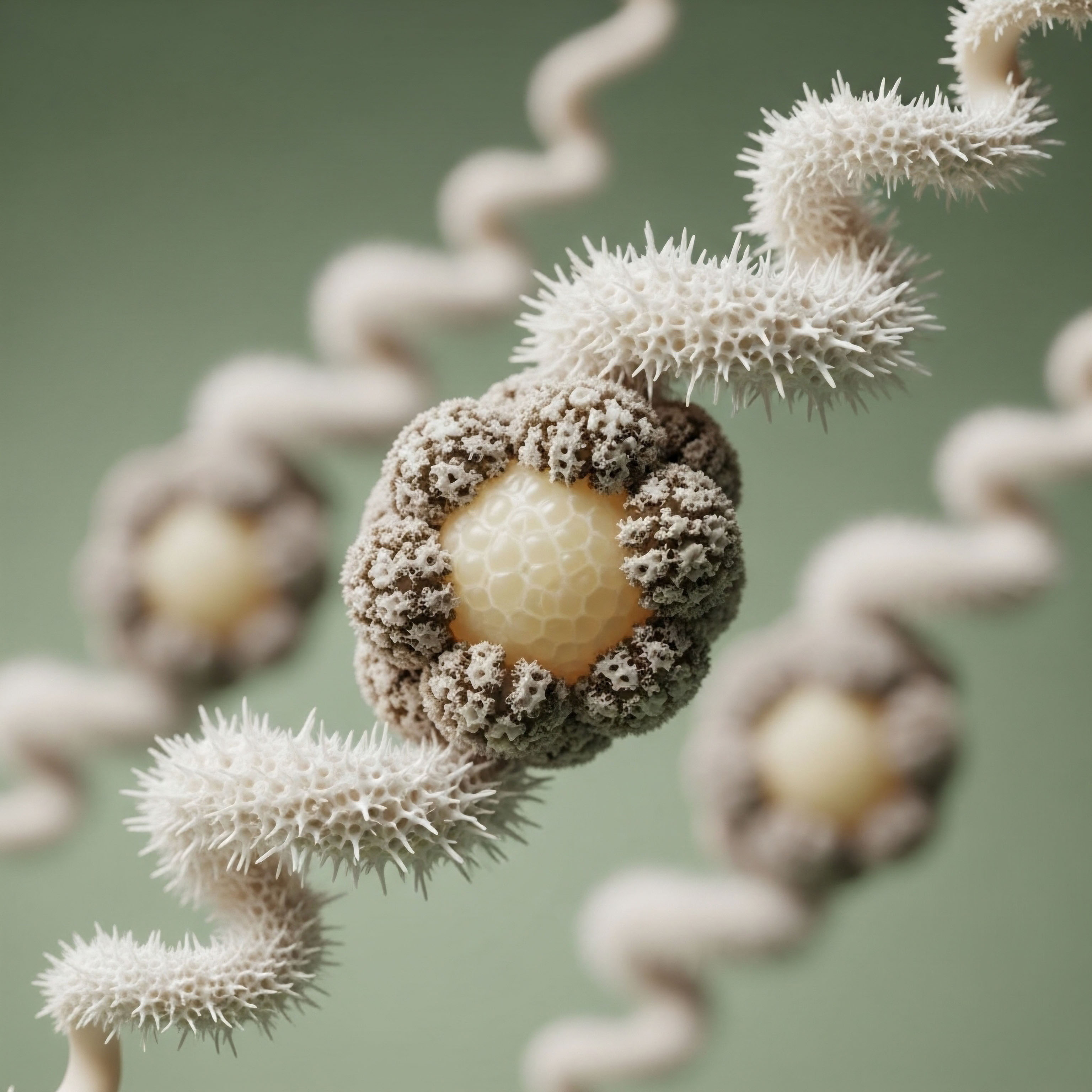

Fundamentals
Have you found yourself feeling a persistent lack of drive, a diminished physical vigor, or perhaps a subtle shift in your overall sense of well-being? Many individuals experience these sensations, often attributing them to the demands of modern life or the natural progression of years. Yet, these feelings frequently signal deeper physiological shifts, particularly within the intricate messaging network of your body’s endocrine system. Understanding these internal communications is the first step toward reclaiming your vitality and functional capacity.
Your body operates through a sophisticated orchestra of chemical messengers, known as hormones. These substances direct nearly every biological process, from your energy levels and mood to your physical composition and reproductive health. When these messengers become imbalanced, the effects can ripple across your entire system, manifesting as the very symptoms you might be experiencing.
For a long time, the conversation around male hormonal health centered primarily on testosterone levels. While testosterone is undeniably a central player, the broader picture involves a complex interplay of various hormones, metabolic pathways, and cellular signals. A truly comprehensive understanding requires looking beyond single markers to appreciate the interconnectedness of your internal environment.
Understanding your body’s hormonal messaging system is key to addressing subtle shifts in well-being and reclaiming vitality.
Berberine, a compound derived from several plants, has gained considerable attention for its influence on metabolic health, particularly its capacity to support healthy glucose regulation. It acts on various cellular targets, including the enzyme AMP-activated protein kinase (AMPK), which plays a central role in cellular energy homeostasis. This action helps cells utilize glucose more efficiently, reducing circulating blood sugar levels.
The connection between metabolic function and hormonal balance is undeniable. Conditions like insulin resistance, often characterized by elevated blood glucose, can directly influence the production and activity of hormones, including testosterone. When cells become less responsive to insulin, the body compensates by producing more insulin, a state known as hyperinsulinemia. This chronic elevation can disrupt the delicate balance of the endocrine system.

The Metabolic-Hormonal Connection
Consider the relationship between metabolic health and male hormones. High blood sugar and insulin resistance are frequently observed alongside lower testosterone levels. This association is not coincidental; the metabolic state directly impacts the hormonal milieu. Chronic inflammation, often a companion to metabolic dysregulation, can also suppress the body’s capacity to produce and utilize hormones effectively.
Given berberine’s established role in metabolic support, a compelling question arises ∞ Can this plant-derived compound extend its beneficial influence to male hormonal health beyond its well-documented effects on glucose? This query prompts a deeper investigation into its potential mechanisms of action within the broader endocrine landscape.

Beyond Glucose Regulation
The traditional view of berberine has largely focused on its anti-diabetic properties. However, emerging insights suggest its reach extends further into the intricate web of physiological processes. Its impact on cellular energy, inflammation, and even the gut microbiome positions it as a compound with the potential to influence hormonal pathways indirectly, and perhaps directly, in ways previously underappreciated.
Your personal experience of feeling “off” is a valid signal from your body. By exploring the science behind compounds like berberine and their potential systemic effects, we can begin to connect those subjective feelings to objective biological mechanisms, providing a clearer path toward restoring optimal function.


Intermediate
The human endocrine system operates as a sophisticated communication network, with hormones acting as precise messengers conveying instructions throughout the body. When considering how a compound like berberine might influence male hormonal health, it becomes essential to examine its potential interactions with this complex system, moving beyond its primary metabolic actions.
One significant area of interest involves the Hypothalamic-Pituitary-Gonadal (HPG) axis, the central regulatory pathway for male hormone production. The hypothalamus releases gonadotropin-releasing hormone (GnRH), which signals the pituitary gland to secrete luteinizing hormone (LH) and follicle-stimulating hormone (FSH). LH, in turn, stimulates the Leydig cells in the testes to produce testosterone. Any disruption along this axis can impact testosterone synthesis.

Berberine’s Influence on Endocrine Pathways
Berberine’s capacity to activate AMPK is a key mechanism that could indirectly affect hormonal balance. AMPK activation influences cellular energy metabolism, which is intrinsically linked to steroidogenesis, the biochemical pathway for producing steroid hormones like testosterone. Efficient energy utilization within Leydig cells is vital for their capacity to synthesize testosterone.
Another consideration is the role of sex hormone-binding globulin (SHBG). SHBG is a protein that binds to sex hormones, including testosterone, making them unavailable for cellular uptake. A higher SHBG level can reduce the amount of “free” or bioavailable testosterone, even if total testosterone levels appear adequate. Some research indicates that berberine may influence SHBG levels, potentially altering the ratio of free to bound testosterone.
Berberine’s impact on cellular energy and its potential to modulate SHBG levels offer avenues for influencing male hormonal balance.
The conversion of testosterone to estrogen, a process mediated by the enzyme aromatase, also holds relevance. While some estrogen is necessary for male health, excessive aromatization can lead to an unfavorable testosterone-to-estrogen ratio, contributing to symptoms such as gynecomastia, mood changes, and fat accumulation. Berberine has demonstrated anti-inflammatory properties and may influence enzyme activity, which could indirectly affect aromatase expression or activity.

Connecting Berberine to Clinical Protocols
In the context of male hormone optimization, protocols such as Testosterone Replacement Therapy (TRT) aim to restore physiological testosterone levels. A standard TRT protocol often involves weekly intramuscular injections of Testosterone Cypionate, frequently combined with other agents to manage side effects and preserve endogenous function.
For instance, Gonadorelin is sometimes administered via subcutaneous injections to maintain natural testosterone production and fertility by stimulating the HPG axis. Anastrozole, an aromatase inhibitor, is used to block estrogen conversion and mitigate estrogen-related side effects. In some cases, medications like Enclomiphene may be included to support LH and FSH levels, particularly for men seeking to maintain fertility or recover natural production post-TRT.
While berberine is not a direct hormonal agent, its systemic effects could complement these protocols by addressing underlying metabolic dysfunctions that often coexist with hormonal imbalances. For example, by improving insulin sensitivity, berberine could potentially reduce the metabolic burden that contributes to lower endogenous testosterone production or increased aromatization.
Consider the following potential interactions:
- Metabolic Support ∞ Berberine’s glucose-regulating actions can improve cellular health, indirectly supporting Leydig cell function and testosterone synthesis.
- Inflammation Reduction ∞ Chronic low-grade inflammation can suppress the HPG axis. Berberine’s anti-inflammatory effects could help normalize this suppressive environment.
- Gut Microbiome Modulation ∞ The gut microbiome influences hormone metabolism and overall metabolic health. Berberine’s impact on gut flora could indirectly support hormonal balance.
The table below outlines how berberine’s known actions might intersect with common male hormonal concerns:
| Berberine Action | Potential Hormonal Impact | Relevance to Male Health |
|---|---|---|
| AMPK Activation | Supports cellular energy for steroidogenesis | Aids testosterone production efficiency |
| Improved Insulin Sensitivity | Reduces hyperinsulinemia, a factor in low testosterone | Helps normalize testosterone levels |
| Anti-inflammatory Effects | Mitigates inflammation that suppresses HPG axis | Supports healthy hormonal signaling |
| Gut Microbiome Modulation | Influences hormone metabolism and detoxification | Contributes to overall endocrine balance |
Understanding these connections allows for a more integrated approach to male hormonal health, recognizing that the body’s systems are not isolated but operate in concert.


Academic
The scientific exploration of berberine’s influence on male hormonal health extends beyond its well-established metabolic effects, delving into intricate molecular and cellular mechanisms. A systems-biology perspective reveals how this alkaloid might exert its influence on the endocrine system, particularly the male gonadal axis, through a complex interplay of direct and indirect pathways.

Molecular Mechanisms of Action
At the cellular level, berberine’s primary recognized mechanism involves the activation of AMP-activated protein kinase (AMPK). AMPK is a critical energy sensor that, when activated, shifts cellular metabolism toward catabolic processes that generate ATP, while inhibiting anabolic processes that consume it.
In the context of steroidogenesis, the process by which testosterone is synthesized, efficient energy supply is paramount. Leydig cells, the primary sites of testosterone production in the testes, require substantial ATP for various enzymatic reactions involved in converting cholesterol into testosterone. Berberine’s AMPK activation could optimize this energy availability, thereby supporting Leydig cell function and steroid hormone synthesis.
Beyond AMPK, berberine has been shown to modulate other signaling pathways, including those involving mitogen-activated protein kinases (MAPKs) and the nuclear factor-kappa B (NF-κB) pathway. NF-κB is a central regulator of inflammatory responses. Chronic low-grade inflammation, often associated with metabolic dysfunction, can directly suppress the HPG axis and impair Leydig cell function, leading to reduced testosterone production. By inhibiting NF-κB, berberine could mitigate this inflammatory suppression, creating a more favorable environment for testicular steroidogenesis.
Berberine’s influence on AMPK and NF-κB pathways suggests a direct impact on cellular energy and inflammatory responses relevant to hormone synthesis.

Impact on Steroidogenic Enzymes
The synthesis of testosterone involves a cascade of enzymatic reactions. Key enzymes in this pathway include 3β-hydroxysteroid dehydrogenase (3β-HSD) and 17β-hydroxysteroid dehydrogenase (17β-HSD). These enzymes are responsible for specific conversion steps from cholesterol precursors to testosterone. Research indicates that berberine may influence the expression or activity of these steroidogenic enzymes.
For instance, studies have explored berberine’s capacity to upregulate the expression of certain steroidogenic acute regulatory protein (StAR) genes, which are crucial for cholesterol transport into the mitochondria, the rate-limiting step in steroid hormone synthesis.
The intricate relationship between metabolic health and hormonal regulation is further underscored by the concept of insulin resistance. Hyperinsulinemia, a consequence of insulin resistance, can directly suppress testosterone production in Leydig cells and increase SHBG levels, thereby reducing bioavailable testosterone. Berberine’s well-documented capacity to improve insulin sensitivity and reduce hyperinsulinemia could therefore indirectly lead to an improvement in free testosterone levels by alleviating these suppressive effects.
The table below provides a detailed view of berberine’s potential mechanisms impacting male hormonal health:
| Mechanism of Action | Cellular Target | Physiological Outcome | Relevance to Male Hormones |
|---|---|---|---|
| AMPK Activation | Leydig cells, metabolic tissues | Enhanced cellular energy, optimized ATP production | Supports steroidogenesis efficiency, testosterone synthesis |
| NF-κB Inhibition | Immune cells, testicular tissue | Reduced systemic and local inflammation | Mitigates inflammatory suppression of HPG axis |
| Modulation of Steroidogenic Enzymes | Leydig cells (e.g. 3β-HSD, 17β-HSD, StAR) | Altered enzyme activity/expression | Direct influence on testosterone synthesis pathway |
| Improved Insulin Sensitivity | Adipose tissue, muscle, liver | Reduced hyperinsulinemia, improved glucose uptake | Decreased SHBG, increased free testosterone, reduced Leydig cell suppression |
| Gut Microbiome Remodeling | Intestinal flora | Altered bile acid metabolism, reduced endotoxemia | Indirect influence on inflammation and hormone conjugation/excretion |

The Gut-Hormone Axis
An often-overlooked aspect is the influence of the gut microbiome on hormonal health. The gut plays a significant role in the metabolism and excretion of hormones, including estrogens and androgens. An imbalanced gut microbiome, or dysbiosis, can lead to increased inflammation and altered hormone deconjugation, potentially affecting circulating hormone levels.
Berberine has been shown to modulate the gut microbiome composition, promoting beneficial bacteria and reducing pathogenic species. This remodeling of the gut environment could indirectly support hormonal balance by reducing systemic inflammation and optimizing hormone metabolism and excretion pathways.
The complexity of the endocrine system necessitates a holistic view. While berberine’s direct impact on specific male hormone levels requires further dedicated clinical trials, the existing evidence on its metabolic, anti-inflammatory, and gut-modulating properties provides a compelling scientific basis for its potential role in supporting overall male hormonal health. This perspective aligns with the understanding that optimal physiological function arises from the harmonious operation of interconnected biological systems.

References
- Kim, S. H. et al. “Berberine activates AMPK and improves metabolic abnormalities in high-fat-fed C57BL/6 mice.” American Journal of Physiology-Endocrinology and Metabolism, vol. 296, no. 5, 2009, pp. E1012-E1023.
- Zhang, Y. et al. “Berberine inhibits inflammation in LPS-induced RAW264.7 macrophages by suppressing NF-κB activation and MAPK pathways.” Immunopharmacology and Immunotoxicology, vol. 37, no. 2, 2015, pp. 149-156.
- Li, Y. et al. “Berberine improves glucose metabolism in diabetic rats by inhibiting hepatic gluconeogenesis.” Journal of Biomedical Science, vol. 19, no. 1, 2012, p. 27.
- Kong, W. et al. “Berberine is a novel cholesterol-lowering drug acting through inhibition of PCSK9 expression in the liver.” Nature Medicine, vol. 13, no. 12, 2007, pp. 1392-1398.
- Xu, X. et al. “Berberine modulates the gut microbiota and reduces intestinal inflammation in mice with colitis.” Frontiers in Microbiology, vol. 9, 2018, p. 1721.

Reflection
As you consider the intricate connections between metabolic function and hormonal balance, allow this information to serve as a catalyst for your own understanding. The journey toward reclaiming vitality is deeply personal, rooted in recognizing the subtle signals your body sends. This exploration of berberine’s potential influence on male hormonal health, extending beyond its well-known metabolic actions, offers a glimpse into the sophisticated interplay within your biological systems.
The insights shared here are not a final destination, but rather a starting point for deeper introspection. Your unique physiology warrants a tailored approach, one that honors your individual experiences and goals. Consider how these biological principles might apply to your own health narrative, prompting further dialogue with knowledgeable practitioners who can guide you on a personalized path toward optimal well-being.
The power to recalibrate your internal systems resides within a deeper understanding of their mechanisms. This knowledge empowers you to make informed choices, moving with intention toward a state of sustained health and functional capacity.



